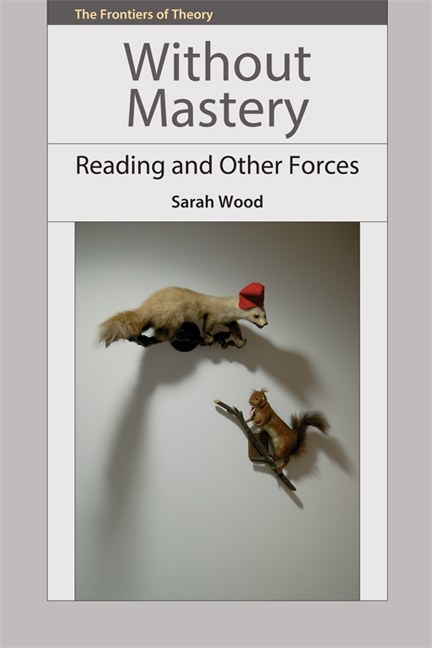Book contents
- Frontmatter
- Contents
- Series Editor's Preface
- Acknowledgements
- Epigraph
- Through the Reader
- Inventing the Reader
- Try Thinking As If Perhaps
- A Mere Instinctive Deconstruction
- Close to the Earth
- Beyond Me Nowhere But This Earth
- Edit
- Reading Matters
- Some Thing, Some One, Some Ghost (About the Fires of Writing)
- Nightshift
- Too Late To Begin?
- Notes
- Index
Try Thinking As If Perhaps
Published online by Cambridge University Press: 05 August 2016
- Frontmatter
- Contents
- Series Editor's Preface
- Acknowledgements
- Epigraph
- Through the Reader
- Inventing the Reader
- Try Thinking As If Perhaps
- A Mere Instinctive Deconstruction
- Close to the Earth
- Beyond Me Nowhere But This Earth
- Edit
- Reading Matters
- Some Thing, Some One, Some Ghost (About the Fires of Writing)
- Nightshift
- Too Late To Begin?
- Notes
- Index
Summary
This chapter begins, eight times over, to think about thinking. Its official thought-process began with a contribution to a colloquium called ‘The Ethics of Tropes: Writing the Feminine’, and the text remains marked by this title, which interested me very much, and does so still, but which naturally was not of my choosing. I responded to it, as to a kind of necessity. Necessity led me back to the beginnings of Western thought, for it was Plato who got us started thinking about necessity, and he approaches necessity, ananke, both as a concept and as the proper name of a mythical being, merciless, unredemptive, who happened, for the Greeks, to be feminine. Sexual difference comes into the thinking of Necessity, and necessity (how one defines it and how one responds to it) also touches ethics. Already with Plato a sort of figurative play affected the term ananke, leaving something to be read. Both Freud and Derrida, thinkers who bring us closer to an understanding of thought and the operations of sexual difference, have picked Ananke up. (But then, how could they avoid her?) The colloquium's subtitle: ‘Writing the Feminine’ lent itself to the notion that writing may be a way to think about something as apparently given as the experience of being a man or a woman. My wish at the colloquium was simply to say that thinking is an experience of necessity and that this must involve an encounter with sexual difference. No ethical answers emerged. My main concern, necessarily, was with writing, and reading. And so it remains.
In the course of reading Plato's Phaedrus, Derrida asks some ethical questions about writing: ‘Is writing seemly? Does the writer cut a respectable figure? Is it proper to write? Is it done?’ Following Socrates, he answers at once: ‘Of course not’, and immediately qualifies: ‘But the answer is not so simple …’ It is risky to put oneself on the side of the writer, but when it comes to the ethics of writing, they are the ones to look to. The author whose thinking is most important to this chapter is Elizabeth Bowen: her fiction provides not only examples for my argument but gives me a paradigm for thinking in general.
- Type
- Chapter
- Information
- Without MasteryReading and Other Forces, pp. 24 - 41Publisher: Edinburgh University PressPrint publication year: 2014



